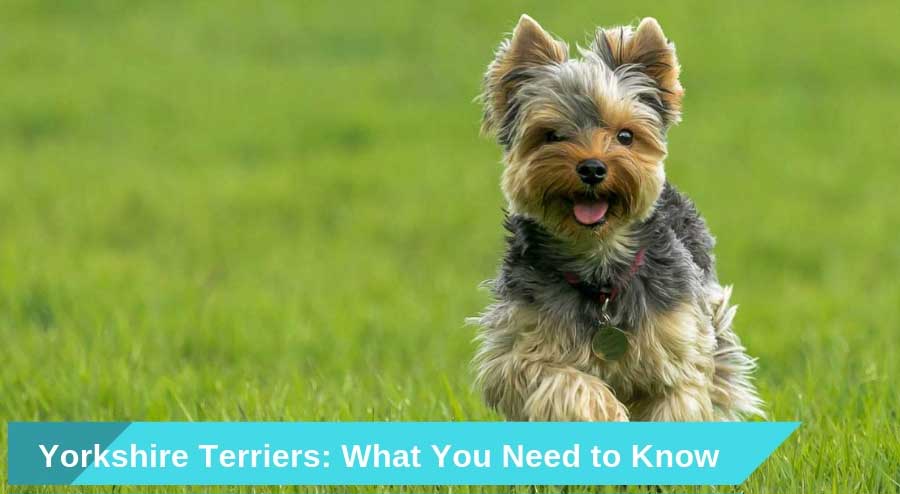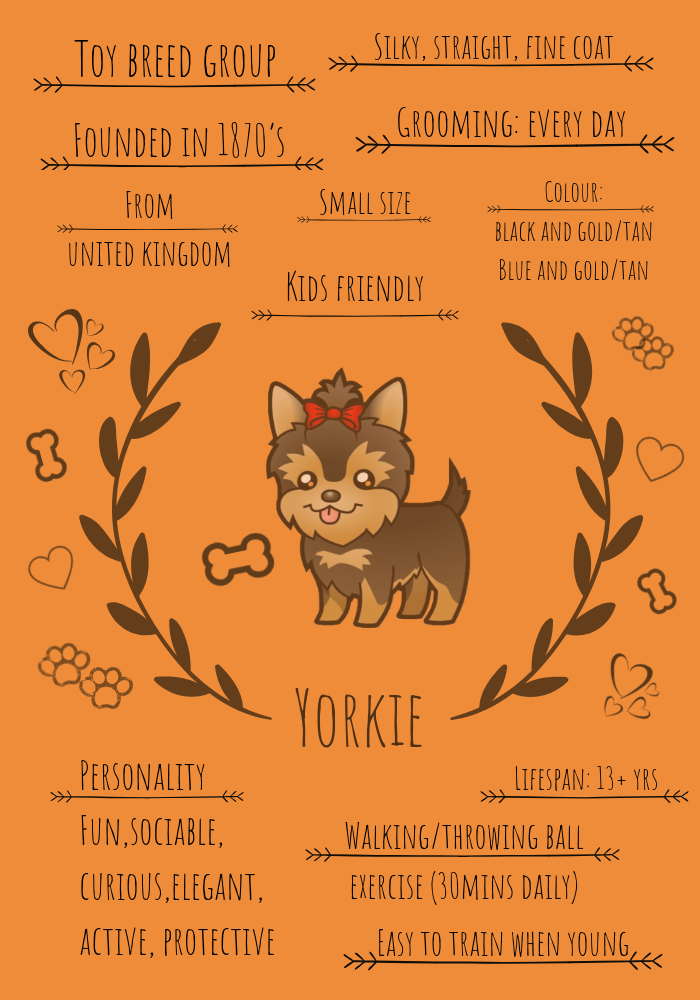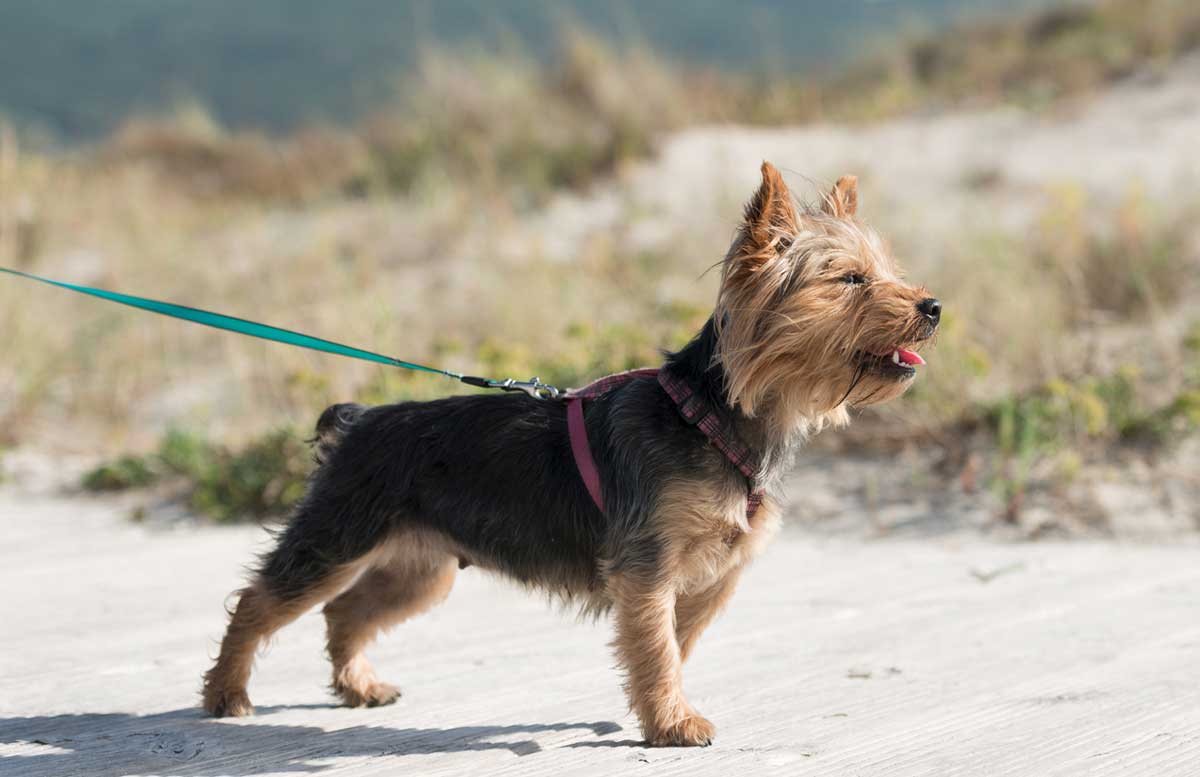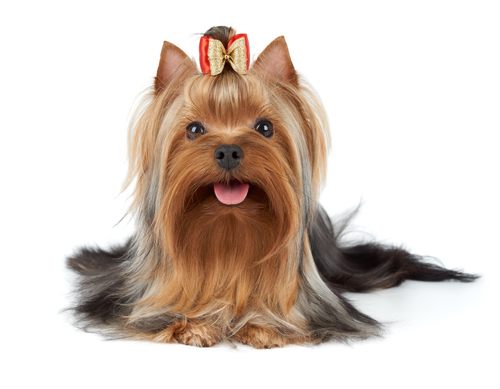It is not easy having a little dog. All small being, be they human or canine kind have that special ability to show a lot of attitude and be very hard to handle while remaining adorable and lovable, leaving you only to pet them and feed them. Yorkshire terriers are no different, as their immeasurable cuteness is only surpassed by their will to play with you.
As all dogs, Yorkies are complex, but in their own special ways. They are easy to feed and exercise due to their small stature, but need grooming and can often retain their puppy temperament even in old age. If you are a person that is short on nerves, this breed probably won’t be your cup of tea, but if you are a calm and composed dog lover, a Yorkshire terrier can be the dog you have always wanted.
Contents
- What Makes Yorkshire Terriers Special?
- Yorkie Physiology
- Health Issues
- Daily Exercise Requirements
- Exercise Plan
- Exercise Issues
- Yorkie inside the House
- Grooming Yorkshire Terriers
- Phycology
- General Attitude
- Attitude toward Children
- Attitude towards Other Dogs and Animals
- Training Your Yorkie
- Training and Playing Equipment
- Leashes and Harnesses
- Traveling with a Yorkie
- Feeding Your Yorkie
- Puppy Feeding
- Adolescent Diet
- Senior Yorkie Diet
- Supplements
- Treats
What Makes Yorkshire Terriers Special?
The most interesting thing about Yorkies is their psychology. Their mind can only be described as a mixture of larger, more outdoorsy, dogs and small companionship breeds. They like to be groomed, and they like to be pampered, and have no issues jumping into mud as soon as they have the chance.
This variety in interest means that how your furry friend will look like really depends on the nature of the dog owner. From the outside, a Yorkie can either seem as a little princes, bows in the hair and everything, or as a running mop, fluffy and happy. Your best solution is to find a balance between grooming and playing, as keeping the dog clean will keep them healthy, but letting them roll around in the grass from time to time will keep them happy.
Yorkie Physiology
Probably to no one’s surprise, Yorkies are considered a small breed. An average dog will be around eight or nine inches tall at the shoulders and shouldn’t weight more than seven pounds. At some times they may seem larger because of their fur that doesn’t shed, and at these times you should check if your four legged friend has gained any actual weight as obesity is a constant threat for smaller dogs. Yorkies that have been born larger in the litter can lead a healthy life with only limited hip problems, but for those that gain weight as adult dog this can lead to severe issues.
While you may be tempted to purchase a teacup Yorkie, it is advised to take a moral stand against this practice, as teacup Yorkies are made by stunted growth of normal Yorkies. This can bring in a whole plethora of health problems and should be considered cruel. If no owners request a pet that has stunted growth, there wouldn’t exist a breeder willing to do it.
Health Issues
Compared to other breeds, the Yorkshire terrier is a fairly healthy dog. Most problems arise from external problems such as the dog’s diet or training and exercise regiments, with only a few that can be considered genetic.
Primarily, Yorkshire terriers are very prone to catching a cold, as their fur is very light and doesn’t protect as much as you may think, while still retaining a lot of water and humidity that they often pick up from dew in the grass or by other means. Because of this, you must insure that your Yorkie is always dry. Rule of thumb is that if you are cold in a light sweater, your Yorkie is cold as well.
Additional things to look after are hip dysplasia and elbow dysplasia, as these are somewhat common with smaller breeds in general. When buying your dog from a breeder, make sure that it has been given clearance from the vet for all of those issues, and received hip x-rays.
Finally, you should always bring your dog to the vet for regular health checkups, even if there are no signs. Having your vet follow the health and development of your dog will give them an easier time recognizing symptoms early and treating your dog to the best of their abilities.
Daily Exercise Requirements
Despite their small build, Yorkshire terriers are quite athletic dogs. They have a lot of energy, and mixed with their attitude you would be better to spend that energy in the park than on your furniture.
Thankfully, because of the size compared to humans, it is very easy to keep the pace needed to exercise a Yorkie wile going for a walk, and even easier to throw the ball far enough for them to spend a lot of energy retrieving it.
Exercise Plan
Exercise plans for a Yorkie are not physically intensive, but will bring major advantages if you manage to keep them at regular pace and regular time. This is why it is best to organize your dog’s exercise plan around your own daily schedule, walking the dog twice a day, to the park and back, for around 30 minutes each time.
Keeping a steady pace while walking is essential, as it will keep the dog focused on you and not often distracted by various scents and sounds that can be encountered in the street.
Finally, having a ball should be regular for all walks, provided that you are in a place where you can use it safely. Throwing the ball and letting the Yorkie retrieve it will save you energy, while still giving your dog a place where it can spend all of that explosiveness in few well-places throws.
Exercise Issues
As a responsible dog owner you should realize that your Yorkie, despite all of their energy, is still a very small dog. Walking too quickly, or even running, will be too much for the dog to handle for a longer period. If you notice your Yorkie breathing heavily or pulling back on the leash you should ease up the tempo and give the little guy a break.
Additionally, it is wise to consider the size of the ball you are carrying. Having a ball that is too small will make it hard for your dog to find, while anything larger like a tennis ball will make it impossible for the dog to retrieve.
Yorkie inside the House
Yorkies are intelligent and should be extremely hard to train, but can be headstrong and stubborn when it comes to obeying house rules and staying off the furniture. While female Yorkies will probably train themselves not to do their business in the house, male Yorkies may pee inside even after training as to mark their territory. You should be aware of this behavior and make a lot of noise when it is done.
If your dog is trained from a young age, this shouldn’t be a problem, but if not, you may experience several issues when it comes to jumping on furniture and peeing near the door. It is not advised to train your Yorkie if you don’t have any experience, as they can be quite willful and owners usually have a weak spot that they can exploit, and will.
Grooming Yorkshire Terriers
While your terrier will need more grooming than most dogs, Yorkie owners can take comfort in knowing that their dogs sincerely enjoy getting groomed.
In general, your dog should bathe once every two weeks, if having an average lifestyle. As most dogs are either cleaner or dirtier than the average, you will need to judge by yourself if your dog requires more or less care. Additionally, Yorkies require haircuts and pedicures, which should be done every three months or so, depending on how you want your dog to look. Dogs that are more active will benefit from frequent haircuts but will not need their nails clipped as often, with the opposite being true for dogs that prefer being at home.
As these tiny dogs are prone to bad breath and can catch a dental disease, you should get your Yorkie used to brushing teeth from an early age.
Finally, when brushing the dog’s teeth, or washing them, always remember to use products that are meant for dogs as human products are highly toxic to animals. On the other side, it is completely safe for you to use their grooming products.
Phycology
Yorkies are very active and very playful. They can play with people for hours and often have a favorite toy that they will want you to throw for them so that they can retrieve it, even when inside the house.
They are prone to the ‘’Napoleon Syndrome’’ and they do get more stubborn and bolder as they age, which may seem cute, but is dangerous. Yorkies will often attack bigger dogs that they don’t like, or even cats, which is problematic because they will very rarely win those fights if left to their own devices.
General Attitude
Although they do often suffer from the Napoleonic Complex we have mentioned previously, they usually have a happy and playful attitude.In environments where they feel safe and secure they will lay around and play, even when alone.
Because they are playful and energetic, it is best for them to have one, if not several, chew toys that will be preferable for them to tear apart instead of the furniture.
Attitude toward Children
In general, Yorkies are good with people, including children. While they do prefer the elderly due to slow and predictable movements, they have no issues being around children and playing with them and will not see them as competition as some other breeds do.
This being said, a Yorkshire Terrier will often regard a child as its equal, and will show the same sensibilities toward the child as it does toward the dog. If the kid is kind and takes care of the dog, they will be the best of friends, but if there is any pulling of the hair, limbs, or ears, there will be biting involved. For such a tiny dog, Yorkies to pack a mean bite.
Attitude towards Other Dogs and Animals
As many other small yet intelligent breeds, Yorkies are racist. In most cases, they will just ignore most other animals, as well as other dogs, but they will rarely accept another dog in ‘’their’’ house, especially if it is not another Yorkie. In the park, they may gain some courage to even attack other dogs.
While on a walk, you should always keep your dog leashed, as they are known to attack even bigger dogs, which may lead to problems for everyone.
Training Your Yorkie
If you start the training of your Yorkshire terrier on time, and set realistic and age appropriate goals, they should be trained with ease.
In the first few months, you should focus on making the dog housebroken and engage in basic obedience training. This may be difficult at times as Yorkies will try to use their cuteness to their advantage, and if they manage to break you, you will spoil them in no time.
Use treats, toys, as well as belly rubs to reward good behavior and to reinforce the idea that they should be a good boy as much as possible. If they do something wrong, it is best to use the silent treatments as ways to reprimand the dog. Getting angry and yelling during training is not useful for you or the dog.
Finally, if you have any questions you should consult a professional trainer that will inspect your dog and give you specific tips that should benefit your regiment.
Training and Playing Equipment
Your basic playing and training tools are a good leash or harness, a throwing ball of suitable size, and a chew toy that the dog will play with when alone. Additionally, carrying treats, as well as doggy bags, should be in your inventory every time you leave your house with your dog.
You will use the leash every time when going outside and try to train your puppy Yorkie to walk beside you at all times and to disregard all of the scents and sounds that are on the street. You should teach them from a young age that sniffing and exploring is once you are in the park and off the leash. This will keep your puppy, and later your adult dog, safe when going about.
The ball is also important, as it will save your from the trouble of pacing yourself all the time and running around with the dog. You only need to make sure that the ball is of the right size and that it is neither a choking hazard nor too big for your dog to carry.
Leashes and Harnesses
A leash is quite a basic tool in the life of your dog, but unlike larger dogs Yorkies can have problems with using only a leash with a collar, and not a harness. A harness will prevent your little dog from choking and give it much more information on where you want to go and at which speed.
Aside from being better for the dog’s health, a harness can also be more stylish. Only thing to remember is that a bad-quality harness can make issues with the fur. Always check if there is hair stuck in the harness, or if the dog is squabbling to get out of it.
Traveling with a Yorkie
Traveling with a Yorkie is exceptionally easy. Regardless if you are using a car, a train, or even the plane, a Yorkie can come on board and travel safely. They will have most fun in cars, and the least fun if they need to stay in the transporter in the plane. This last part can be mended if you are able to register your Yorkie as an ESA or Emotional Support Animal.
Having your dog become an ESA is not easy, and you will need to show that you do, in fact, need the dog with you. But, if you indeed possess the need for an ESA, it is possible.
Feeding Your Yorkie
As with any small size dog, finding a correct balance in the dog’s diet will be tricky, and you may require to put some additional effort in finding the correct food. Yorkies are a very active breed and they will need a lot of protein, especially in their early age. But, they are also bread to be small size dogs and they don’t need a lot of food to stay healthy. As is the case with many dogs, and many humans now-a-days, obesity is a very serious issue.
Puppy Feeding
While your Yorkie is still a puppy, you should base its food on protein, giving it around half a cup of food, three times a day. Depending on the dogs size, you can put a little bit less or a little bit more.
Adolescent Diet
Once your puppy has become an adolescent dog at about 6 months of age, you can switch to feeing it 1/3rd of a cup of food each meal, for three meals a day. This can be anything from raw food to wet canned food.
The easiest way for most people is just giving the dog a full cup of dry kibble in the morning after the walk and leaving the dog to freely feed itself. This way the dog can keep its blood sugar constant and keep your mind from that particular need of your dog.
Finally, while you can give your dog scraps, and it will eat them quite gladly, always keep in mind what is it that you are giving them. Hexose sugars, which are all sweets, and some other things are utterly toxic to dogs, while others like chicken bones are just choking hazards.
Senior Yorkie Diet
Once your Yorkie has become older, you will need to focus more on the dietary fiber and vitamins, as well as omega 3 and 6 fatty acids, than on protein. Make sure to select only senior dog food that is made with senior dog needs in mind.
Feeding your aging dog a proper diet means that they will be more active and happier in their senior years, leaving you more time to spend with your best friend.
Supplements
As the name suggests, supplements are there to supplement the dog’s diet. Depending on the food you are feeding the dog, you may need to give them additional vitamins and minerals, as well as fatty acids such as omega 3 and omega 6 oils. Always advise with your veterinarian about any supplements you plant to give to your dog.
Applied when needed, supplements can be a great way to boost the vitality and health of your dog. Overusing, or randomly medicating, supplements can be useless at best and dangerous at worst.
Treats
All dogs love treats. You should always bring a couple of treats in your pocket, especially while you are training the dog. Remember that treats often have a high nutritional value and you should keep in mind how much treats you are giving.
Finally, treats should be, well, a treat. Teach your dog that they will be getting a treat when they are doing something good, and not getting them when they are bad. Having a relationship with your dog that is based on honesty, love, and belly rubs is one that will be beneficial and fulfilling for everybody.
I grew up in a household that was filled with animals. I believe that my fate as a dog-loving person was sealed in early childhood since my parents owned several dogs of varying sizes and breeds. There was no choice but to take care of and learn about dog habits and the best animal care practices — otherwise, I’d be clueless about how to go about the creatures I was surrounded by day and night.
As a life-long puppy lover, I know a thing or two about dogs and how to go about caring for them in the best way possible. Although I’m not a professionally trained dog behaviorist, trainer, or veterinarian, all of my knowledge and experience with canines comes from a place of love and a deep-rooted passion for dogs and animals in general.
Seeing as dogs kept me company throughout every stage of my life, I decided to follow a different path in my academic life and obtained a Bachelor’s and Master’s degrees in Marketing Management and Digital Advertising, which ultimately allowed me to combine my professional training and personal experience by creating the ultimate dog lover’s resource website! Along with my husband, Dave, I run MySweetPuppy for like-minded dog lovers who want to have a single, clear, and reliable information source about anything and everything related to dogs and their well-being.





